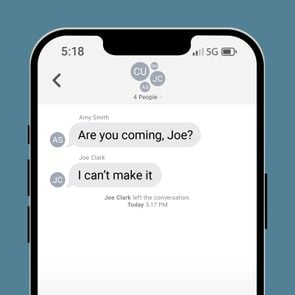How Late Is Too Late to Cancel Plans? 12 Tips from Etiquette Experts
Updated: Mar. 19, 2024

From weddings to birthday parties to happy hour with friends, our experts share exactly what you need to know about when and how to cancel plans
You made plans with friends for a girls’ night out … only to have a surprise work deadline come up. Or you booked a date weeks in advance … only to come down with a nasty cough the day before. Or perhaps you volunteered to chair the PTA fundraiser and now … well, you just don’t have the energy to deal with it. We’ve all been there, faced with the prospect of needing to back out but not sure how to cancel plans politely and kindly.
Why is it such a big deal to cancel? Plans are about priorities and how we choose to make use of our limited time and energy. “Oftentimes, having to cancel plans isn’t so much about etiquette as it is about time management,” says Jan Goss, founder of Show Up Well, an etiquette consulting agency. “Learning how to set boundaries, how to say no and how to value yourself will keep you from overextending yourself and will greatly reduce the number of times you end up in this situation.”
OK, so not getting in the position in the first place is ideal, but sometimes things just come up. That’s life! But backing out of plans at the last minute can leave you feeling guilty and your friends and family members more than a little irritated. We talked to etiquette experts to find out just how late you can cancel plans (without annoying everyone)—and how to do it the right way.
Get Reader’s Digest’s Read Up newsletter for more etiquette tips, humor, cleaning, travel, tech and fun facts all week long.
How to know if you should cancel your plans
“Once a commitment is made, unless you have a legitimate excuse, it’s rude to cancel. Period,” says etiquette expert Lisa Grotts, founder of the Golden Rules Gal. So what, exactly, is a legitimate excuse?
“Without question, death, travel delays, severe illness and other things out of your control are understandable,” Grotts says. “But changing your mind because you ‘had a long day’ or are ‘too tired’ or because you got a better offer are not good reasons.” You run the risk of not just hurting the other person’s feelings but also making yourself look flaky and untrustworthy.
Of course, there are excuses that fall in a gray area, like a work project that is taking longer than anticipated, a mild (noncontagious) health issue or not finding childcare in time. In those instances, should you find a way to make it work? “These decisions often come down to integrity, because ultimately it’s about whether you are a person who keeps their word,” Goss says. “If you are normally someone who follows through, then people will understand and forgive the occasional cancellation. But if this is something that happens often, then it doesn’t matter how ‘legitimate’ your excuse is—people will see you negatively.”
Not to mention that if you cancel one too many times, you may find yourself off future guest lists and with far fewer friends, Grotts adds. Getting ditched is one of the things most people dislike, and it harms your relationships.
How late is too late to cancel plans?
In most cases, if you’re canceling within hours or (yikes!) minutes of an event, it’s too late. And for more formal events, it’s essential to send your regrets much earlier. “The short answer will always be do it ‘as soon as possible,'” Goss says. “It’s human nature to want to put off having a difficult conversation, but the longer you wait to let the other person know, the more rude it becomes and the more inconvenienced and upset they will be.”
When deciding when and how to back out, follow the golden rule: Put yourself in the other person’s shoes and consider how your cancellation will affect them, adds etiquette expert Kelly Browne, author of 101 Ways to Create Mindful Forgiveness. canceling plans in every situation.
When you’re sick

Getting sick is one of the most commonly used excuses for canceling plans, and it can be a very legitimate one—a lesson we learned all too well during the pandemic, Browne says. In this case, it’s never too late to cancel. “If you are ill and know that what you have is contagious, or just think it might be, it’s always better to err on the safe side and stay home, even if it is last minute,” she says. Nobody wants their wedding ruined by COVID or explosive diarrhea!
How late is too late: Never
When it’s an event that required an RSVP and you already said “yes”
Events that require RSVPs, like weddings, baby showers and galas, require responses for a reason: Each person costs the host money, and they need to know how many guests to plan for, Goss says. Your no-show isn’t just inconvenient or sad—it’s expensive. Good wedding etiquette says that barring a serious unforeseen problem, you should give the host at least two weeks’ notice if you need to change your RSVP. Why two weeks? That’s generally the cutoff to give the final head count to caterers, Goss explains.
Cancel no later than: Two weeks before the event
When it’s an event that requires a ticket
Movies, theater productions and some parties require tickets to be purchased in advance, meaning that whomever invited you has already invested in your attendance. The earlier you let them know you can’t make it, the more likely they will be able to get a refund or find someone else to take your place, Browne says. If you do end up canceling at the last minute, it is common courtesy to offer to pay for your tickets anyhow, she says.
Cancel no later than: One week before the event
When it’s a work function

You may love getting together for work events, or you may dread them. But either way, if they are part of your job or company culture, you need to make a good-faith effort to attend, Grotts says. Some people see “fun” work events, like holiday parties, as more work … especially since they’re usually unpaid. But the reality is that this is how working relationships are strengthened. So if you do need to cancel, make an extra effort to connect with your co-workers in a different setting, or find a way to compromise—say, by coming for part of the time or helping with the prep work.
Cancel no later than: One week before the event
When it’s a place that requires reservations
Similarly, if your plans involve going to an upscale restaurant, a museum, a wine tasting, a tour or another event that requires reservations in advance, you should give extra notice. This allows the person who invited you to cancel the reservation or find someone else to fill your spot. Again, if you have to cancel at the last minute and they were unable to fill your spot, you should offer to reimburse them for the cost they are out (if there is any), Browne says.
Cancel no later than: Three days before the event
When it’s a life celebration
Birthday parties, baby showers, graduation parties, divorce celebrations, job-promotion parties, milestone-anniversary parties—celebrating your loved ones’ big life events is one of the best parts of having loved ones! These sometimes don’t require RSVPs or reservations, but the meaningfulness of the event should give it extra importance in your schedule. “This is one time when you can really show up for your loved one (literally), helping them feel extra loved and supported on their special day,” Goss says. Plus, she adds, if you simply don’t show up, they may end up waiting for your arrival to start the party … until it becomes clear that you’re just not coming.
This may be a good event to try to compromise on attending. “You could come for part of it, or ask someone to FaceTime or Zoom you in for the important parts,” Browne says. And, adds Goss, if you committed to bringing something—like a gift or food—do your best to make sure it still gets there on time. “You can have flowers delivered or Doordash the appetizers,” she suggests.
Cancel no later than: 48 hours before the event
When it’s a casual get-together

“Want to grab drinks on Friday?” Or: “I’m having a game night this weekend. Want to come?” Casual get-togethers can be fun and are a great way to bond with friends, family or co-workers, but because of their casual nature, they’re the events most frequently bailed on. “Your absence may not cost them a lot money-wise,” Goss says, “but it can take a real toll on your relationship, especially if it happens often.” And aside from the rudeness factor, it’s just annoying.
“Good friends always understand a last-minute change of plans and the need to reschedule—we all have busy lives,” Browne says. “However, if you constantly cancel plans, you either need to rethink that relationship or your priorities.”
Cancel no later than: 24 hours before the get-together
When it’s a first date
You’ve matched with someone on Hinge or you’ve been set up on a date—but you end up not being able to make it. Ghosting is all too common in these situations, and even though the person is basically a stranger, you still owe them the common courtesy of canceling. Is there anything more painful than showing up for a date, waiting for an hour (or more) and then realizing the other person isn’t coming? (The one exception, Goss says, is if the person has made you feel unsafe.)
That said, you can cancel a date for any reason; it doesn’t even have to be a “legitimate” one. “Never feel like you need to go out with someone out of obligation,” Browne says. “You are wasting their time as well as your own.”
If you don’t want to go out with them after all, cancel politely but firmly. If you’re using an app, communicate the cancellation through the app—don’t give out your personal contact information, Goss says. On the other hand, if the reason for your cancellation is something unavoidable and you still want to see them, offer to reschedule.
Cancel no later than: 12 hours before the date
When it’s a repeat date
You’ve started seeing someone, and even though things aren’t serious yet, you’d like to see them again. In this case, canceling plans should be done with more care, Goss says. This is because canceling for any reason—even a totally legit one—can feel like rejection. You don’t owe anyone a full explanation for canceling plans, but this might be one case where you could offer a little more detail so they know you’re not trying to back out of the relationship.
“One of the cardinal rules of relationships is that if someone wants to spend time with you, they will find a way to do that,” Browne says. “So if you value the relationship, cancel and then make a plan to reschedule.”
Cancel no later than: Six hours before the date
When it’s a date with a long-term partner or spouse

Unfortunately, people tend to be more likely to cancel plans at the last minute with their spouse because “family understands.” They know that person will forgive them—as opposed to their demanding boss or needy friend. “Don’t do this!” Goss says. “These intimate relationships deserve even more care and consideration when canceling plans, not less.”
Browne adds: “As an important relationship in your life, cancel plans only if absolutely necessary. You want to assure that person that you value and treasure your time together, so explain your reason for canceling and immediately reschedule your date.”
Cancel no later than: Two hours before the date
When you’re the host
Sometimes the person hosting the event is the one who gets sick or has a personal conflict that requires calling off the whole thing. This is a much bigger deal than one person backing out of plans, but chances are you wouldn’t be doing it if it wasn’t an important reason. “Just be considerate of how your guests will be impacted by the cancellation, especially in regard to travel, costs, time and childcare,” Goss says. And know this: A great host will cancel as soon as possible.
“This is a situation where technology is your friend,” Browne says. “You want to get the information out quickly, so send an email or text saying something like: ‘Unfortunately, due to circumstances beyond our control, we must cancel our party. We look forward to celebrating with all of you at a future date.'”
Cancel no later than: One week before the event
When it’s a true emergency
There are some reasons for canceling that are so catastrophic—think: a death, serious accident, medical crisis, natural disaster, terrorist attack or mass shooting, or extended flight cancellation—that your primary focus should be on caring for yourself and your loved ones. If you have time (like if you’re stuck at an airport for hours), it’s a courtesy to let the other person know that you need to cancel, and you should do this as soon as possible. But generally, people will understand if you aren’t able to give them advance notice, Grotts says.
How late is too late: Never
How to cancel plans without being rude

Once you’ve decided you need to cancel plans, your focus should be on doing it in the kindest, most helpful way possible. “The culture these days has gotten more relaxed about proper cancellations, but this isn’t about protocol—it’s about compassion,” Goss says. “This is about responsibility, integrity and respect for the other person and how your backing out will impact them. It’s likely they will be, at the very least, disappointed, but they may also be greatly inconvenienced or out money. You need to acknowledge that.”
Here’s how to cancel plans while still being polite and kind.
Don’t say “yes” when you mean “no”
The best way to cancel politely is to avoid having to cancel in the first place. Too many people make plans with someone or agree to attend an event that they really don’t want to follow through with—leading to last-minute cancellations. Instead, learn how to politely decline an invitation so that the only invitations you are accepting are ones that you prioritize, Browne says.
Cancel in person or over the phone
“Face-to-face is best, but voice is second when canceling plans, because it adds a personal touch,” Goss says. Texts and emails are OK too, especially when responding to digital invitations, and that’s certainly better than simply not showing up. But again, you should cancel in person or via phone whenever possible.
Don’t lie or exaggerate
You shouldn’t lie about your reason for canceling plans, and don’t use “I’m sick” as a “get out of things you don’t want to do” card. “The more often you use these made-up excuses, the less credible they become,” Goss says. The truth has a way of coming out, especially if you show up somewhere or post on social media the next day, appearing to be perfectly fine.
Apologize
A solid apology should be the heart of any cancellation. You don’t have to accept blame, wallow in it or insult yourself—life happens, and you’re allowed to cancel plans. Just offer a sincere “I’m so sorry,” and then move on. “Apologize, make amends if necessary and then let it go,” says Goss. “You don’t need to keep feeling bad about it.”
Don’t offer detailed excuses
It’s tempting to give the other person a full explanation of your violent stomach bug so they know how serious you are about canceling, but restrain yourself. “It’s not necessary to share personal details,” Browne says. “Simply say something like, ‘My apologies, I am not feeling well,’ or ‘I’m so sorry I won’t be able to make it tomorrow.'” In fact, over-explaining is one of the telltale signs someone is lying.
Thank them for the invitation
Be sure to acknowledge the person’s kindness and thoughtfulness in extending the invitation in the first place, Browne says. This can also be a good time to offer a compliment or well wishes. Depending on the event you’ll be missing, try something like, “Thank you so much for thinking of me. I know it will be a magical night, and I can’t wait to see pictures!”
Don’t waffle
“If you are canceling, be crystal clear about it,” Goss says. This means not saying things like: “I probably can’t make it, but I’ll try,” “I hope I can still make it, but it’s not looking good” or “If I can find childcare, then I’ll come.” These kinds of answers may feel like you are sparing their feelings, but they are actually incredibly unhelpful, because it makes it difficult for them to plan around you. It also makes you look flaky, Goss adds. If you’re unsure, then your answer should be no.
Offer to make it right
As noted above, in some situations, the other person isn’t just disappointed by your cancellation—they’re inconvenienced by it as well. So if the other person will be out money for tickets, offer to pay for yours anyway. If you promised to bring something, deliver it ahead of time. If it’s a gift-giving occasion, send the gift regardless of your attendance. If it’s a big life event, offer to meet up with them afterward so they can show you pictures or tell you about it.
Reschedule
If this is a relationship you want to preserve, then offer to reschedule—and don’t just say, “Let’s do it another time!” It should be a sincere, detailed offer, Browne says. Here’s a mini script of what to say to get you on the right track: “I’m so sorry I can’t make it tonight, but I’d love to spend time with you. What does your schedule look like next week? I could do lunch Wednesday or Thursday.”
About the experts
- Jan Goss is the CEO and founder of Show Up Well consulting, which provides training in etiquette and leadership. She focuses on a common-sense approach that blends protocol with kindness. She is also the author of two books, Protocol Power and Bedroom Etiquette.
- Kelly Browne is an etiquette expert and the author of 101 Ways to Create Mindful Forgiveness: A Heart-Healing Guide to Forgiveness, Apologies, and Mindful Tools for Peace and 101 Ways to Say Thank You: Notes of Gratitude for Every Occasion.
- Lisa Grotts, also known as the Golden Rules Gal, is an etiquette expert who focuses on blending traditional rules with modern needs. She is the author of A Traveler’s Passport to Etiquette and previously served as the Director of Protocol for San Francisco mayor Willie L. Brown Jr.



